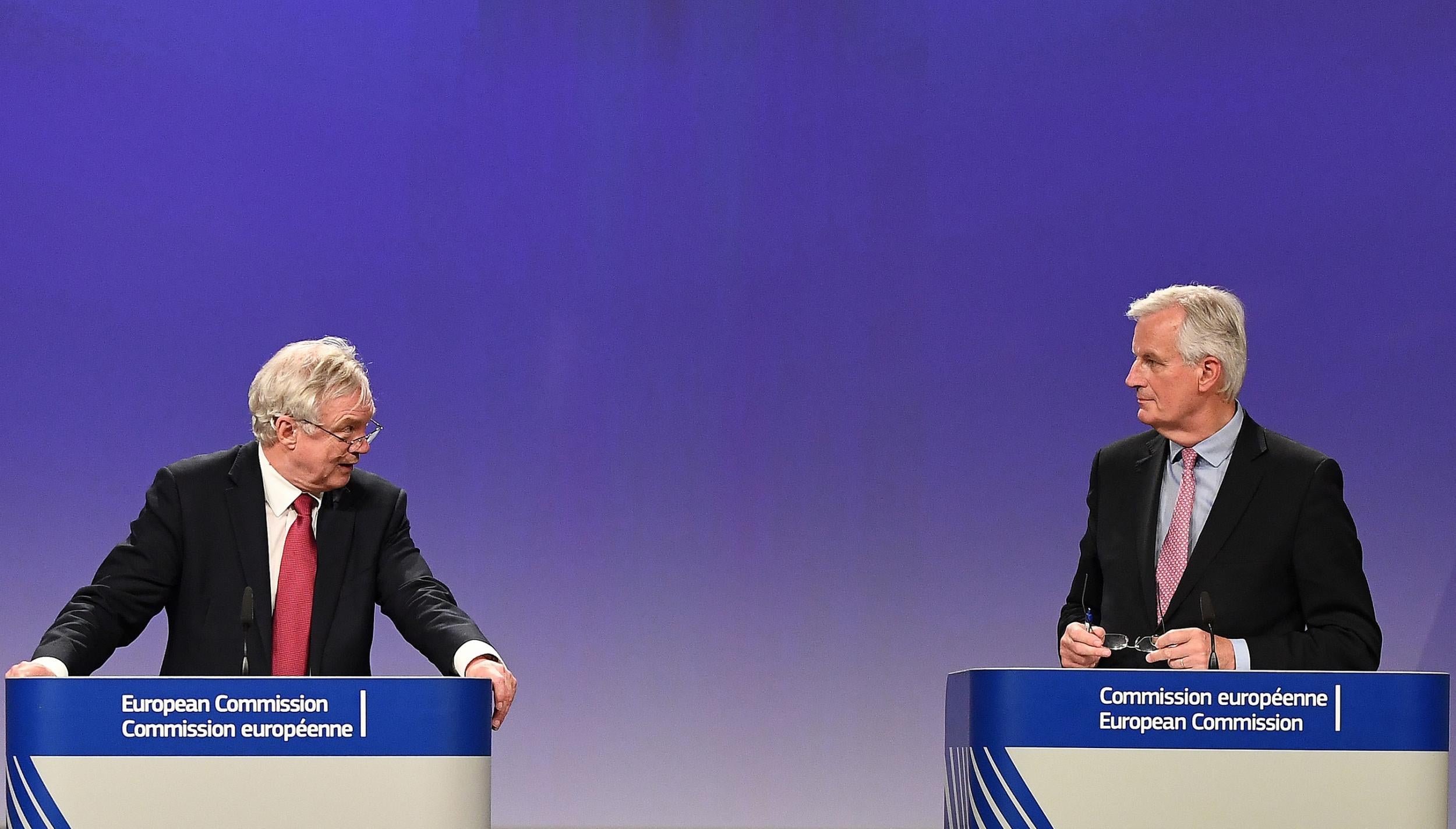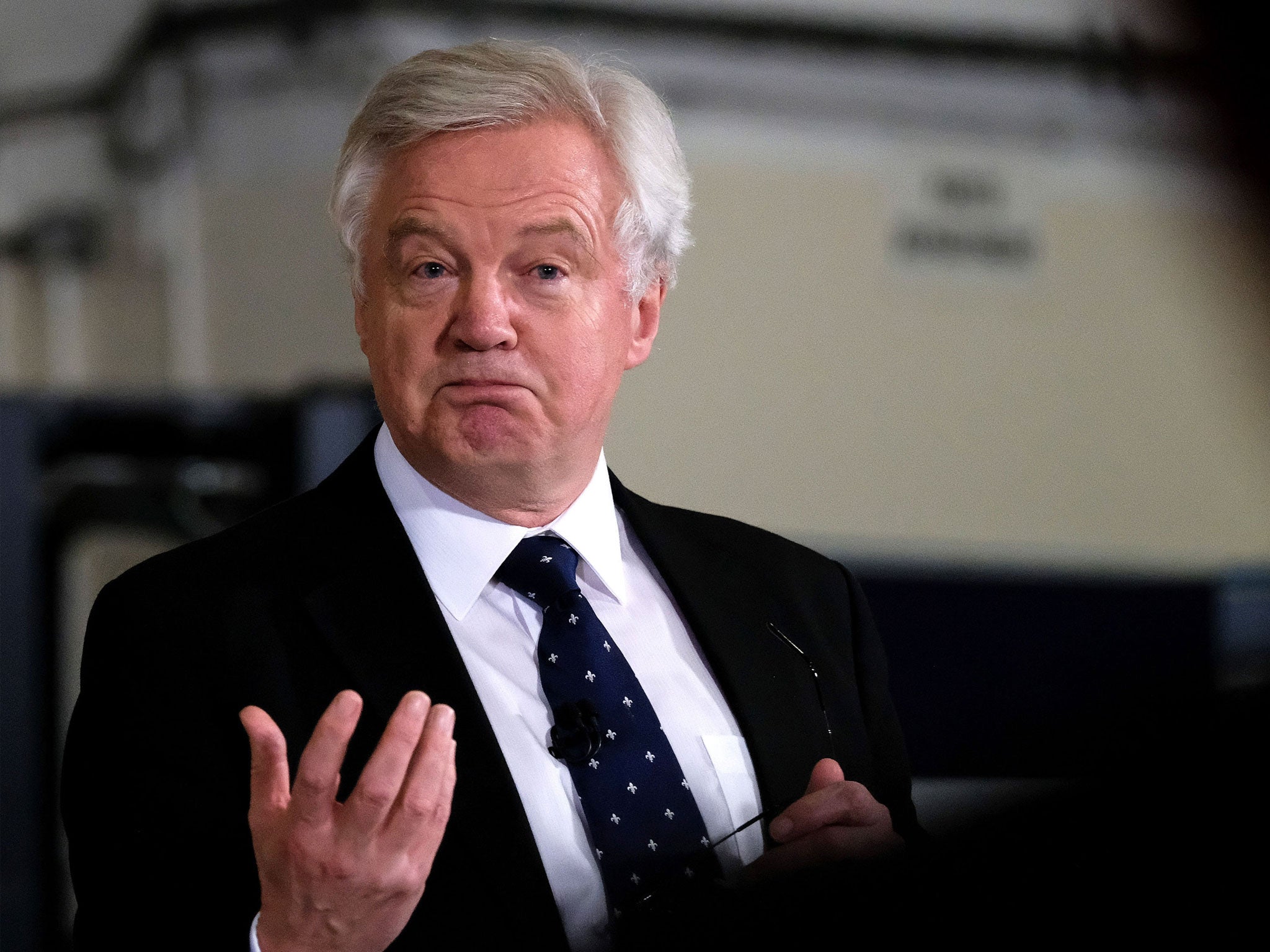Brexit: UK and EU set to clash as Brussels publishes negotiating demands
Cabinet minister David Davis has warned of 'arguments' to come after Brussels set out its position

Britain was on a collision course with the EU today after Brussels laid down strict rules for how the UK should act during the Brexit “transition”.
Cabinet minister David Davis said “arguments” with the EU are coming about the UK’s ability to negotiate free trade deals and reject new EU law during the two-year period after 2019.
It came after Brussels published plans that gave no ground on either issue and instead insisted the UK follow EU regulation until at least 2021 and potentially even longer.

In moves set to particularly outrage some Tory backbenchers, Brussels appeared to even reopen parts of the withdrawal deal many MPs believed settled last year and signalled that trade talks are likely to continue well after Brexit.
Conservatives demanded Theresa May take a tougher line and sought solid assurances in the Commons that Britain will not adhere to European rules and regulations for longer than two years after withdrawal.
Their pressure follows a weekend of renewed speculation about Ms May’s leadership, with talk of more MPs demanding a vote of no confidence in her and Cabinet manoeuvres for a succession.
Downing Street attempted to play down the UK’s divisions with Brussels after the EU set out its desired terms for the transition period, saying there is broad agreement on how it should work, but admitting “some distance in the detail of our starting positions”.
Under the EU’s desired plans, Britain would continue to allow free movement, accept EU regulation without any say in shaping them, effectively stay in the single market and customs union and follow European Court judgements until at least 2021.
After they were published, senior EU figures also indicated that negotiations on a critical future trade deal would continue during the period, and that it may have to be elongated to allow them enough time – something unthinkable for many Brexit-backing Tories.
In a further move set to anger Brexiteers, the EU said the cut-off date for its citizens to enjoy full rights in the UK should be the end of the transition in December 2020, rather than March 2019 as suggested in the agreement on phase one of the Brexit talks settled last month.
While the UK has already said it also wants a transition that operates under “current terms”, Theresa May is under intense pressure to ensure the UK will at least be able to negotiate free trade deals and reject new EU rules during the period.
While being quizzed by a Lords Committee, Mr Davis said: “There will be an argument about the right to negotiate free trade agreements.
“There will be an argument, I’m sure, about the issue of whether or not we can object to new laws that we haven’t had a say in.”

He said the UK would seek a mechanism to object to any laws imposed during the period that ministers felt would damage the UK’s interests, but neither he nor Downing Street could give any detail on how it might work.
He also said that because of the differences between the two sides positions, the transition may not be agreed by March as planned and that the overall Brexit Deal, which the EU wants agreed by October, may not be nailed down until “the end of the year” – giving little time to ratify it before we drop out of the bloc in March 2019.
The Prime Minister and her Brexit Secretary are under intense pressure not to give any more ground over the transition period, from Conservative MPs who think Ms May has already accepted terms that will tie the UK to EU rules too tightly for too long.
Arch-Brexiteer Bill Cash MP highlighted how Britain will be forced to implement European Court rulings without having a judge on the body and accept free movement – which is believed to have caused most of the anti-EU feeling which led to the 2016 Brexit vote.

Challenging ministers in the Commons, he said: “Is the Government going to reject this new EU ultimatum?”
Former Cabinet minister John Redwood said the EU’s new terms should lead the Government to plan more for leaving the bloc with no deal and reverting to WTO trading rules.
Another former frontbencher, David Jones MP, called on the Government to make “absolutely clear” that the transition would not exceed to years, while Peter Bone MP said the Government must agree a future trade deal before the end of 2019, to stop the transition period being stretched by the EU in the name of finalising trade negotiations.
Europe’s negotiating guidelines for the transition were agreed by EU member states after only a two minute discussion, the European Commission’s deputy chief negotiator Sabine Weyand said on Monday afternoon.
Chief EU negotiator Michel Barnier said: “During transition the UK will continue to take part in the single market, to take part in the customs union.
“It will continue to have all the economic benefits therefore it must also apply all the EU rules. The single market cannot be a la carte.”
If agreed, the period would begin on 29 March 2019, two years after Theresa May triggered Article 50 – and end on 31 December 2020.
Leading Tory Brexiteer Jacob Rees-Mogg has said he believes the proposed transition period amounts to the UK becoming a “vassal state” of the EU.
Ms May’s Brexit “inner circle” of senior ministers met in subcommittee on Monday morning to discuss how the transitional phase could work, including the UK’s demand that it be free to negotiate trade deals with other countries during the period.
Join our commenting forum
Join thought-provoking conversations, follow other Independent readers and see their replies
Comments
Bookmark popover
Removed from bookmarks